
If you ever wonder how to explain the mental load to your other half, you’re not alone. Parenting is hard enough as it is without the heaviness of the mental load affecting your health.
Parenting comes with lots of surprises along the way, such as going through - and understanding - matrescence, kinkeeping, and how much you hate playing with your kid (but you do it anyway) not to mention what new mums go through as they deal with their new body post pregnancy (regardless of whether you're plus size and pregnant or straight sized and pregnant). It can sometimes feel all-consuming, and then there's the mental load...
The mental load is the behind-the-scenes work that keeps your household running. We speak to Anna Mathur, psychotherapist, author of Raising A Happier Mother: How to Find Balance, Feel Good and See Your Children Flourish as a Result (Amazon, £10.99), and mum-of-three and she tells us; “It’s all of those things we carry in our awareness.
While the mental load of motherhood traditionally 'belongs' to the woman, we recognise that in today's world of diverse family dynamics, the mental load belongs to the default parent, female or male.
"The mental load cannot be seen externally, although often due to the energy it requires to hold so many things in mind, you can witness symptoms of overwhelm and depletion.”
Author of Love Your Kids Without Losing Yourself (Amazon, £17.47), Dr Morgan Cutlip agrees. She tells us; "The invisibility of the mental load makes it difficult to explain to our partners and when women are trying to describe it, it can feel like 'one more thing' on their never-ending list of to-dos." In this article, we speak to the experts on task delegation, boundary setting and how to recognise that you are enough as you are.
How to explain the mental load to your partner
When it comes to explaining the mental load, there are many variables to consider, such as words, tone, pace and timing. And yes, we know... having to explain the mental load of motherhood is just another thing to add to your ever-growing list; fit it in between taking the cat to the vets, making tea, sorting the kids' clothes, calling your mum back and that small thing called your full-time job. It's also worth noting that some people in relationships allow the mental load to land solely on one person, because they really don't know or fully understand what it takes to run a family. The top six tips agreed on by our experts Dr Morgan Cutlip, Anna Mathur and Zoe Blaskey are;
- Switch mindset
- Write everything down
- Call it out
- Hand over the whole task
- Set your boundaries
- Pause before speaking
The mental load has been around for forever, but it's only really been talked about and had studies - like this 2023 National Library of Medicine paper, and this 2022 Harvard research paper into the Political Consequences of the Mental Load - into it in recent years. When it comes to explaining the mental load, there are many variables to consider, such as words, tone, pace and timing.
"I had no clue what was going through my wife's head until she suddenly declared all of our son's clothes no longer fit. Before I had even considered this - she had done a full audit, sort, charity drop-off, and ordered new clothes." Dad-of-one, Mark
Approaching a topic like this can easily avalanche into a 'war of comparison' of who does more in the house. Dr Morgan Cutlip, explains how she believes that the mental load has three really important features.
1. Switch mindset
Dr Morgan suggests a really helpful tactic for talking about the mental load is to start the conversation from an “us” vs. “it” place. So that it's not you versus your partner, it's you and your partner on the same team versus the washing up/state of the house etc.
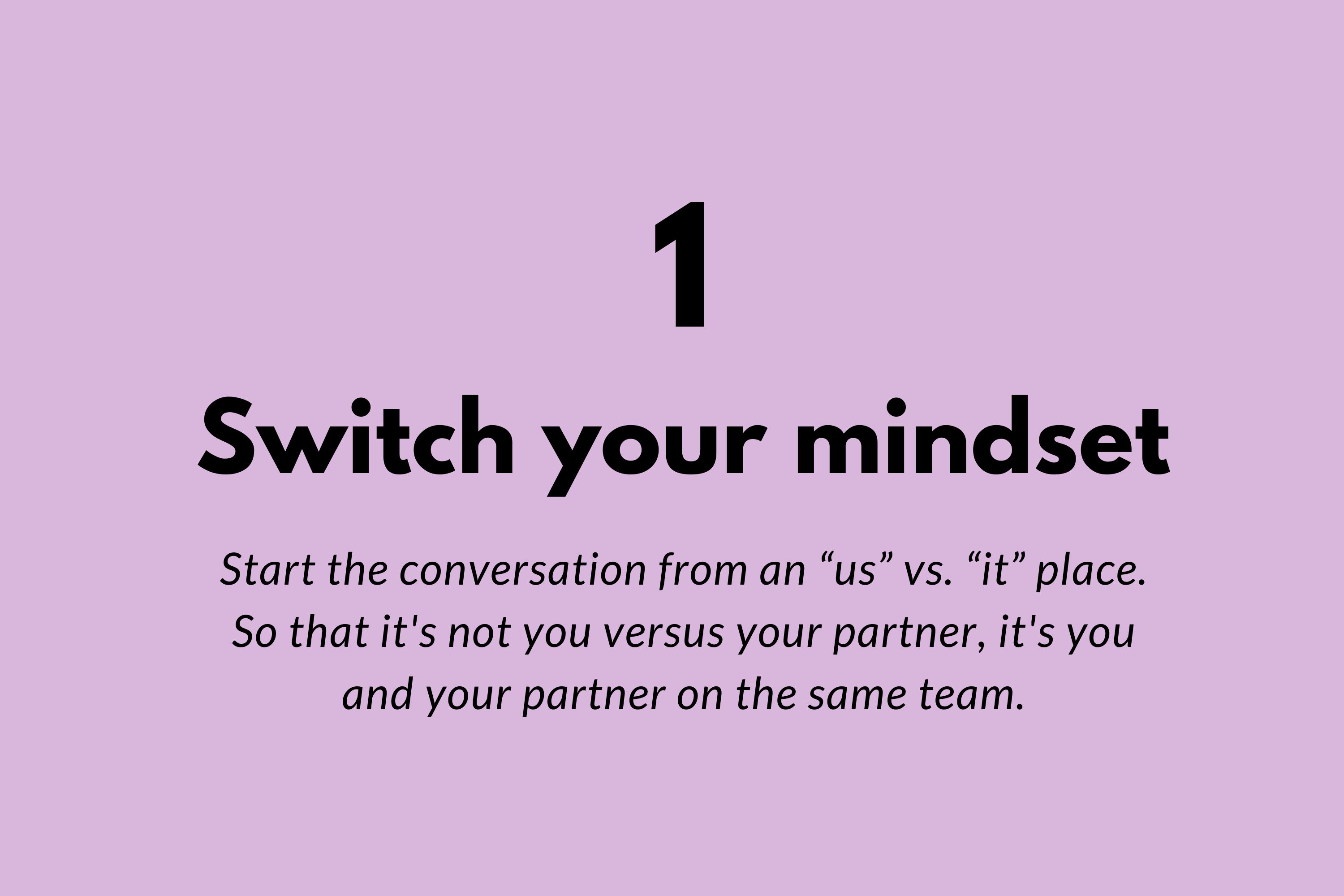
She tells us; "Life is busy, people’s work lives are busy, busy is the norm. So if a couple can agree on the idea that “yes, we’re both busy, but we have to navigate all the responsibilities of life well together” then the conversation will automatically go better than if it is a comparison or “who does more” discussion."
2. Write everything down
"Write it down then question what can be crossed off the list," Anna suggests. "And consider what can be delegated to another day or another person. Perhaps there are things that can be ‘downgraded’ somehow where perfectionism has played a part. For example, do you really need to meal-plan for next week or can you just fill the freezer with some frozen meals in order to give yourself a break and recoup some energy?"
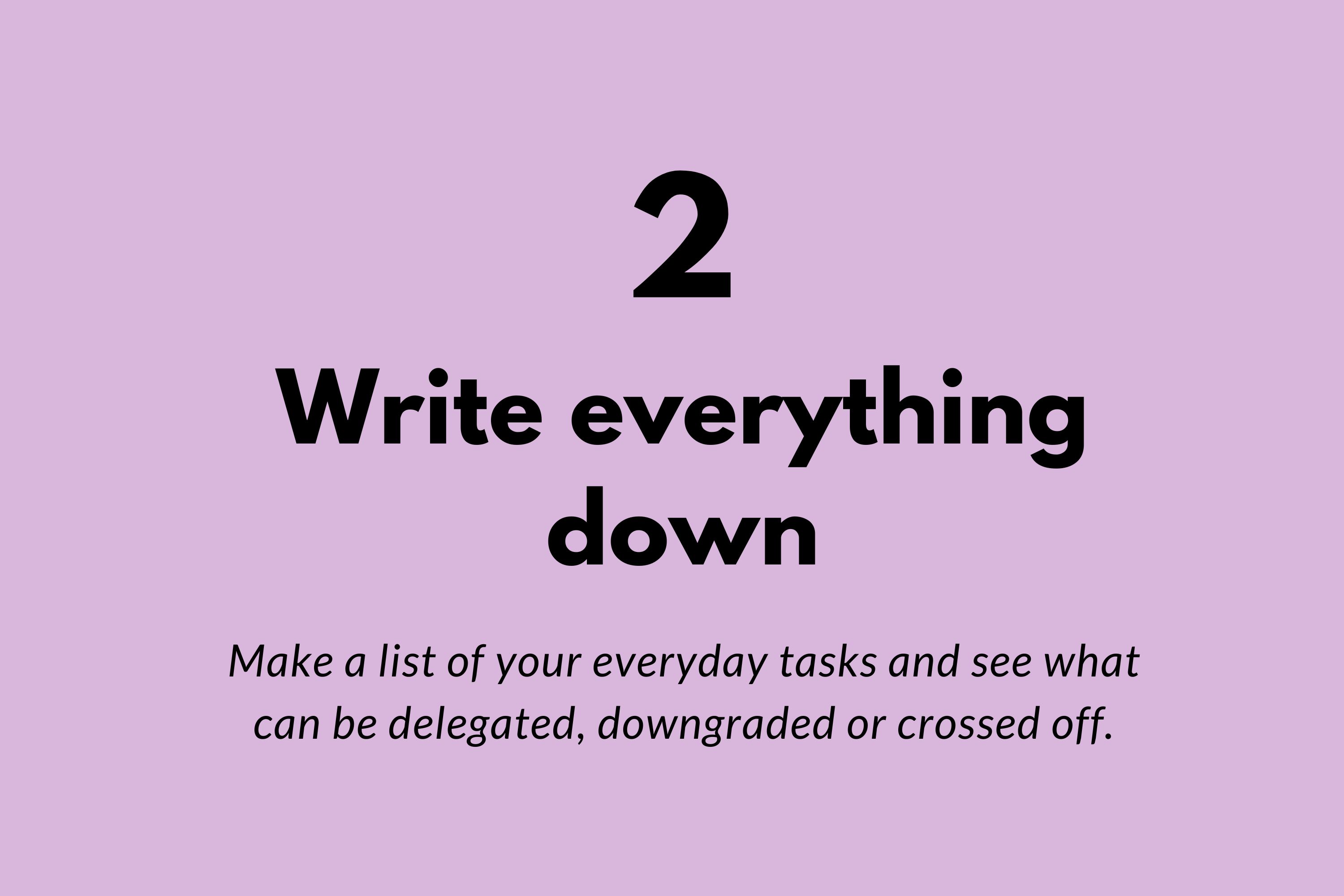
In addition, being honest with yourself and addressing worry and anxiety, and finding new grounding tools, or ways to disrupt cycles of rumination, can be a brilliant way to free up more headspace. Sometimes, when you write things down on paper, you can acknowledge how much there is to do. Anna agrees; "Recognise that you are only one person, with limited capacity, time, energy and headspace."
3. Call it out
Another helpful place to start is by calling out the consequences of an unfair distribution of the mental load of motherhood. Dr Morgan adds; "It’s likely that the partner carrying less of the load has felt these consequences but describing why they exist can be really helpful."
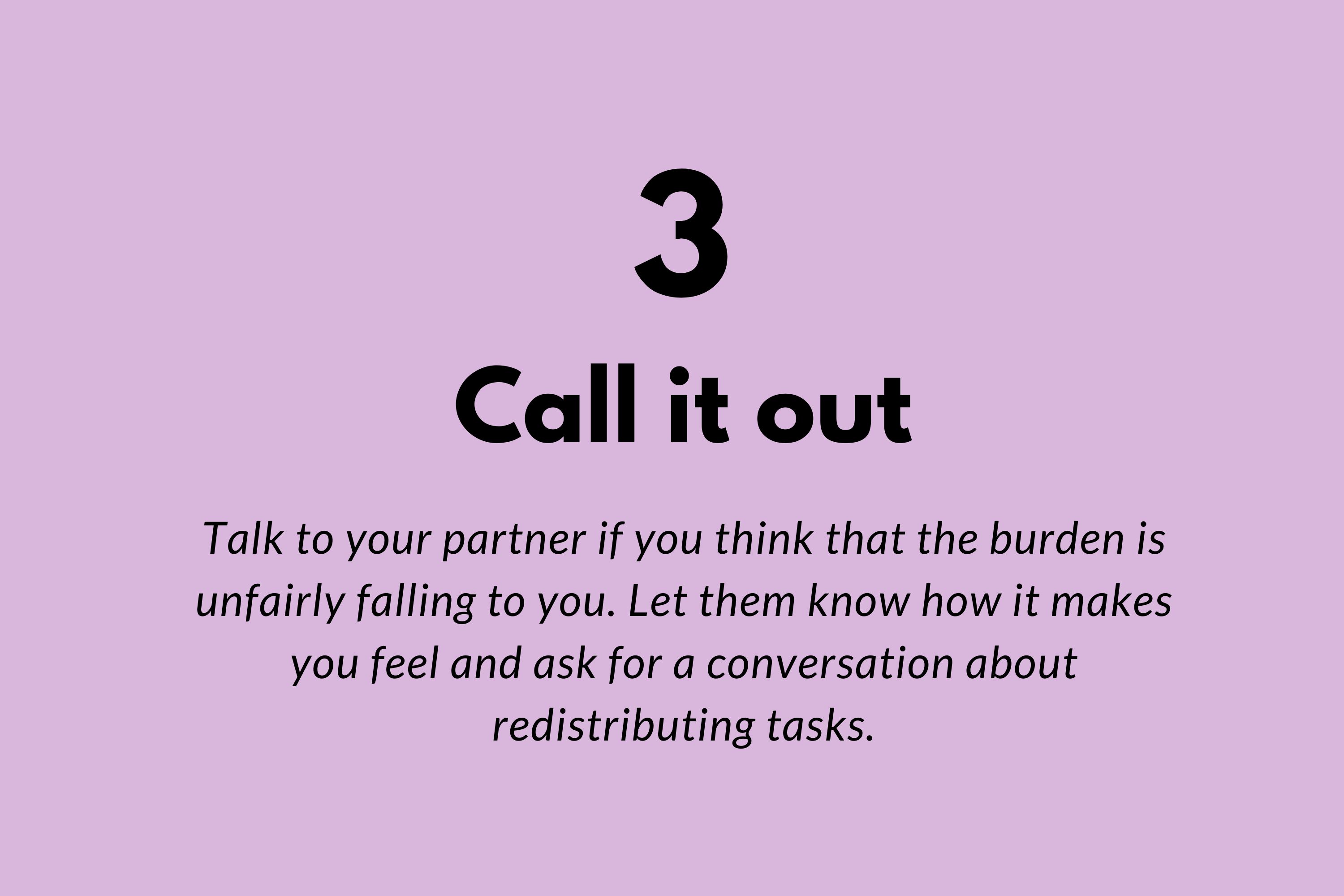
It's about communication and validation and Dr Morgan tells us that it can sound something like this:
'I’m sure you’ve noticed that I’ve been more stressed out and on edge lately. I feel really overwhelmed with all the mental and physical tasks I’m carrying and I don’t like the way that I am showing up with you and the kids. I feel irritated and have trouble quieting my mind. It doesn’t feel sustainable. I want to talk to you about how we can come up with a new way of dealing with all of our tasks of life. Are you up for that? I don’t want this to turn into a competition, I just want to talk about how we can find a better balance so that I’m not feeling so burned out and overwhelmed.'
Our family editor, Stepanie Lowe is in the middle of trying Eve Rodsky's Fair Play Deck -
This is a couple's conversation deck to help you rebalance the work needed to keep your household humming.
This deck of cards gamefies chores and the mental load and here's how your evening will look if you invest in it.
Step 1 - Get snacks, get drinks and sit with your partner for an hour when you're relaxed and feeling good.
Step 2 - Lay out all the task cards, choose only the ones that apply to your family, and take turns deciding which tasks you'll own completely. Then, discuss. (read: convince, cajole, argue,)
Step 3 - Claim your Unicorn Space cards, which allow you time and space to develop and pursue activities and skills that bring you joy, whether that's learning a new language, playing music, or training for a marathon.
Stephanie will be providing a full review of how this went in her home soon, so stay tuned.
4. Hand over the whole task
Consider which things you might be able to delegate, and delegate the whole process, rather than just the job itself. For example, if you are delegating the food shopping, also hand over the other things you hold in awareness so that the other person can have full autonomy and control, and you can release it from your mind! This might look like handing over information on allergies or preferences.
"I'll never forget my husband's face when I said I'd take on the shopping as I could see he was at mental capacity with our son. Then shopping day came and I sat there with my pen and list and asked him what we needed... he looked like he was about to explode. And now I get why." Dad-of-one, Daniel
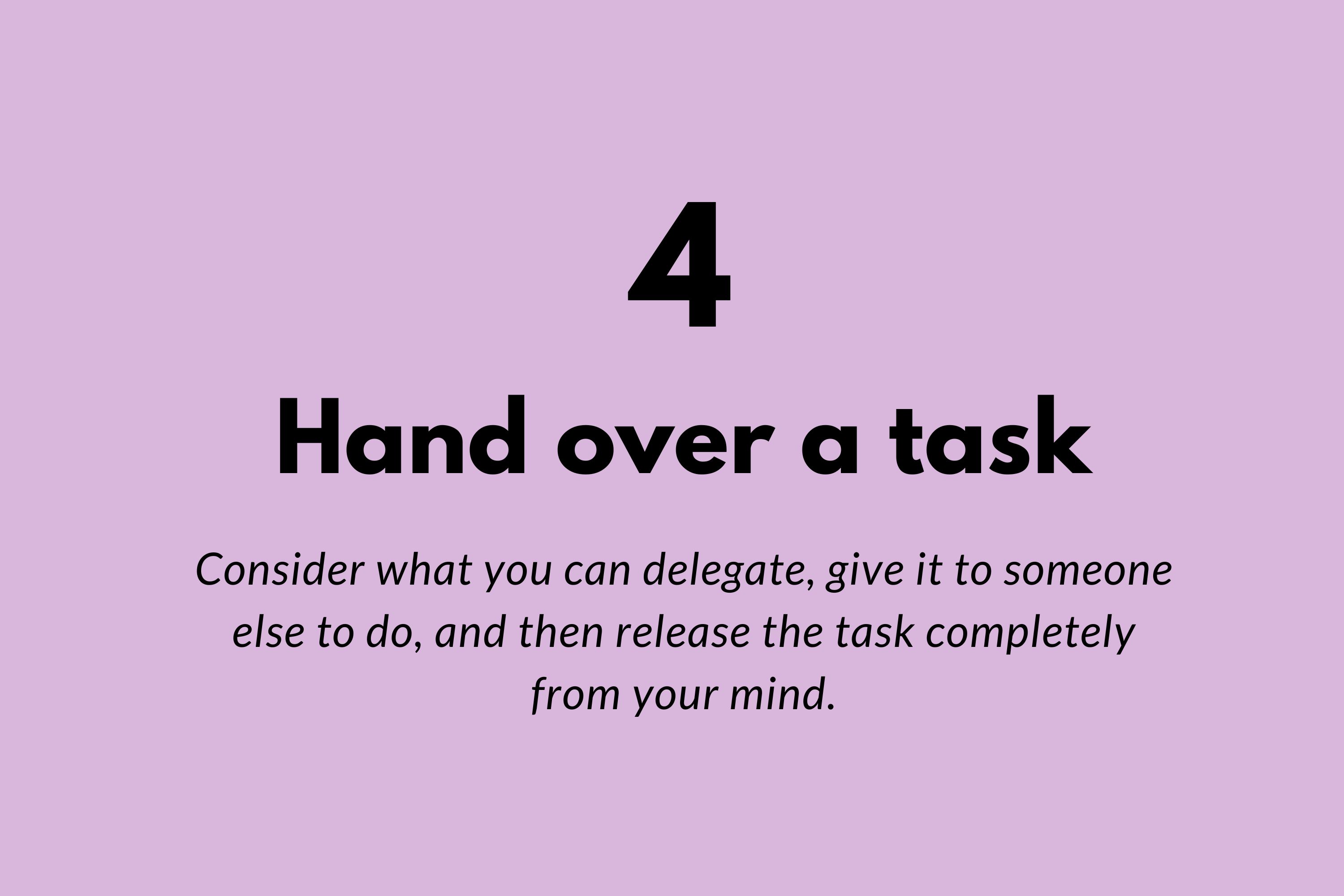
"When you hand things over, know that it might not be done in just the way you like it done." Anna warns. "Perhaps it will be done at a different time, or to a different standard. Perhaps someone might forget in the first instance. But it will only take one mad dash to nursery to drop off a forgotten packed lunch, in order for them to remember next time."
The important thing is that even though someone might not do something in the way you like it done, or to the speed you like it done, you yourself aren’t doing it. This recoups a little time, energy and headspace.
5. Set boundaries
Anna tells us; "Sometimes, when you write things down on paper, you can acknowledge how much there is to do. And remember that you are not failing when you can’t do it all, you’re simply human."
Some helpful phrases to remember when dealing with the mental load of motherhood:
The reason I can’t ‘do it all’ isn’t because I’m not good enough, it’s because I’m human.
Whilst someone else may not do something as well as me, the important thing is that I’m not doing it.
I choose to seek ‘good enough’ over ‘perfect’.
Don't be afraid to say these to yourself anytime you feel overwhelmed by everything that 'needs' doing. Plus, setting boundaries is one of the most important things when it comes to breaking away from the mental load solely being your thing to do. Setting boundaries can look like;
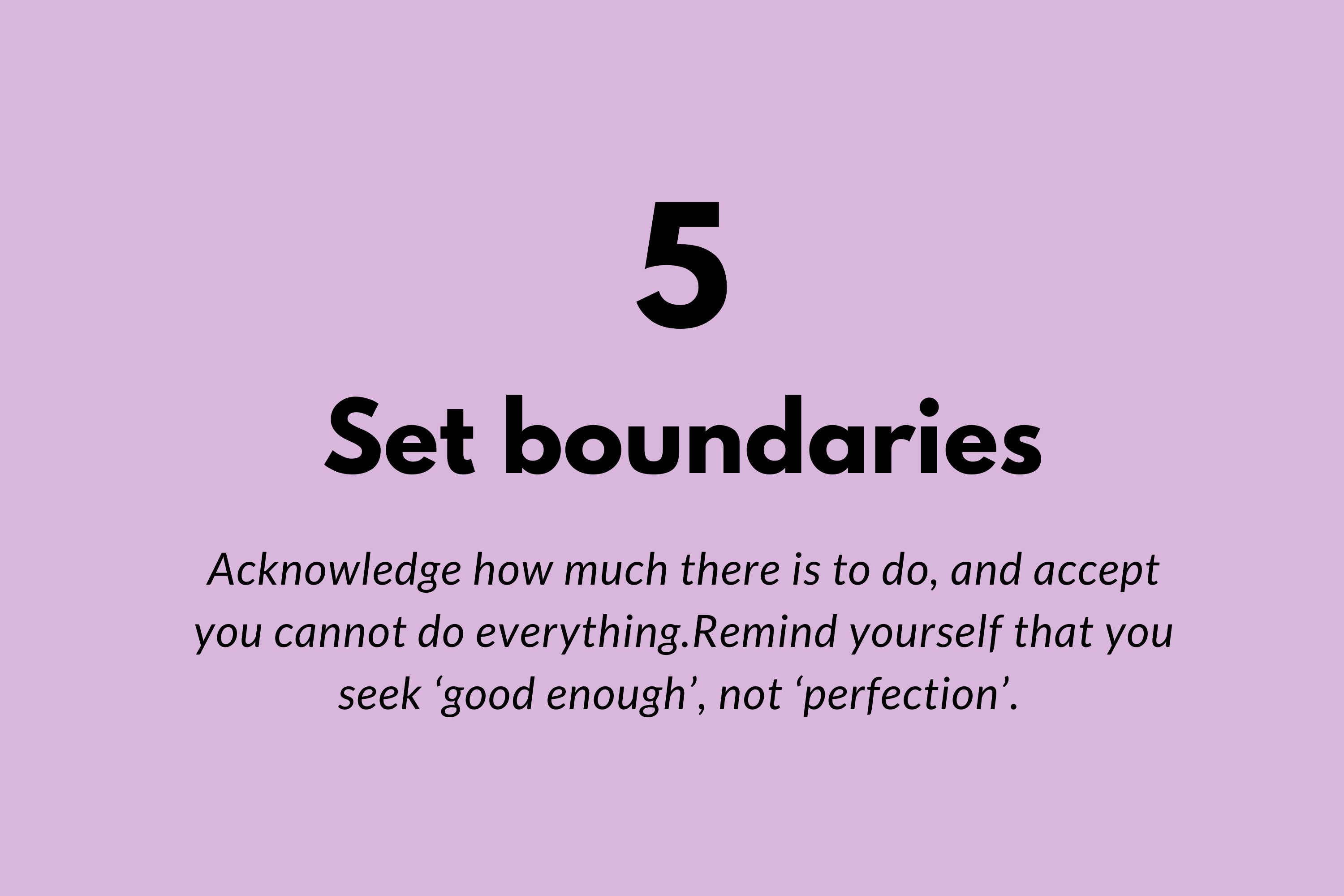
- Writing every single thing down - get it out of your head
- Delegating tasks where you can
- Addressing your worries and free up headspace
- Downgrading tasks where you can
- Practicing saying no (and meaning it)
- Handing over the whole task
6. Think before you speak
When sleep deprivation kicks in, having the ability to stop before you speak can be hard - trust us, we've been there we get it - but it really can make all the difference in your relationship and managing the mental load between you. If you are not the one with the majority of the mental load of motherhood, here's a quick rundown on what to avoid and what to say instead, you're welcome.
Avoid: 'Ffs, you forgot the snacks again?'
If you are not the person responsible for carrying the mental load - and packing everything else up for the family before leaving the house - then you don't get to judge when the person who is forgets something.
Try: 'No biggie, there's a lot to remember. I can stop for snacks on the way.'
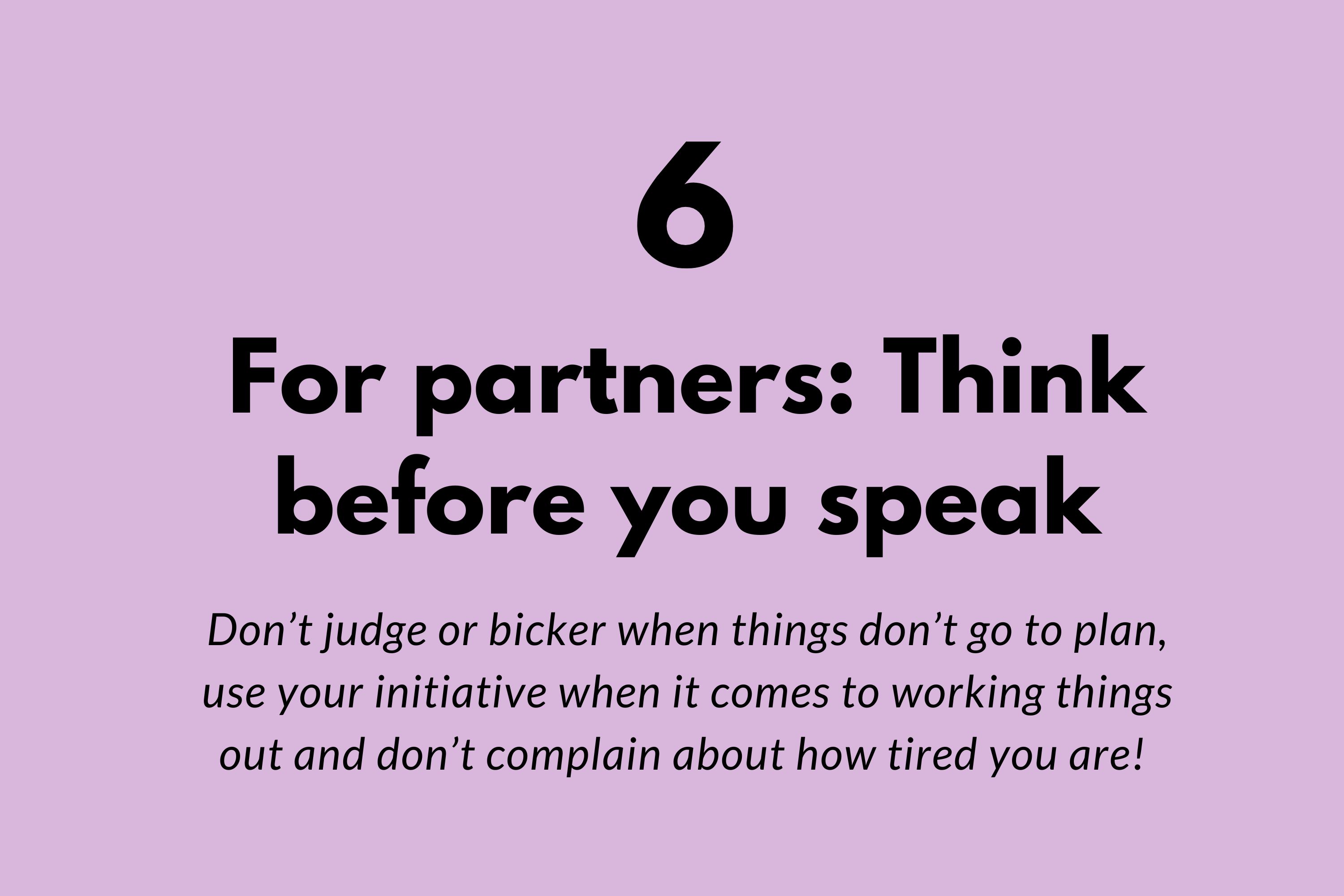
Avoid: 'If you need help just ask/tell me what to do'
We get this comes from a good place, it's full to the brim of good intentions but it's also not useful - using your initiative is. Asking someone to tell you what to do is adding to their mental load.
Try: 'I'm going to *insert help here* while you focus on *task you're already doing*. It might sound like this; 'I'm going to set the table while you focus on cooking.'
Avoid: 'I'm so tired, I didn't sleep a wink last night.'
This will immediately start off the 'who's more tired' competition and - spoiler alert - no one wins. You're both in the trenches, you're both pulling long hours, you're both tired.
Try: 'Shall we get an early night/leave the tidying today/get a takeaway.'
Avoid: 'Hey I did the dishwasher/washing up/hoovering for you.'
The 'for you' on the end implies you think it's solely that person's job and you did them a favour by doing it.
Try: Saying nothing. You don't need to announce when you've completed chores that benefit the whole household.
How do I know if I have the mental load?
- The mental load mainly involves invisible things, like researching the best preschool, remembering to schedule dentist appointments, clothes audits, worrying about whether or not your kid is too old to be having tantrums and doing all the research that’s involved and so on.
- It takes up mental real estate. This is key because when the mental load occupies so much space, it crowds out room for other things (like thinking about sex) and also depletes the capacity to do important things like regulate emotions.
- Many of the tasks are repetitive and never-ending…there’s not much of a finish line. Yes, you’ve finished the laundry, and guess what we’re all wearing clothes so it never ends. This aspect of the mental load can feel oppressive because there’s not a light at the end of the tunnel and also difficult because there’s not the satisfaction of a job completed.
Both Anna and Dr Morgan agree on externalising the mental load of motherhood. Here is their advice on how to get that ball rolling;
Why does the mental load 'belong' to women for the most part?
While there are numerous factors, one reason is the socialisation of women in our society, according to Dr Morgan. "We’re programmed and wired to believe and feel deeply that it’s our responsibility to self-sacrifice for the sake of our relationships," she tells us.
"We then tend to throw ourselves into caring for all of those around us even at the expense of ourselves for various reasons like we believe we should, we enjoy it, it feels good to nurture those we love, and so on. However, the people we’re in a relationship with get so accustomed to our care that many of the tasks we knock out are completely removed from their awareness. Which just means we carry it… unless we make it visible and know that we don’t want to anymore."
Dr Morgan added, "I also think traditionally, men have been socialized to prioritize earning over relationships or even tending to home life. Currently, society is challenging so many of these socialisation trends, but this messaging runs very deep."
The Mental Load comic
You may have heard about the mental load comic called 'You should have asked'. Take a look at the comic. It's by a French comic artist called Emma who, using her artistic skill, illustrates the concept of the ‘mental load of motherhood’ through a comic sketch. It looks at a man expecting his partner to simply ask him to do things - he is viewing her as the project manager of their household chores.
The main difference being in the world of work, project managers step away from the work, as it's done by colleagues set up to do just that. In a home, the 'project manager' also does the work.
How to look after yourself if you carry the mental load
Carrying the mental load of motherhood can be physically and emotionally draining, according to Zoe Blaskey, author of Motherkind: A New Way to Thrive in a World of Endless Expectations (Amazon £15.63).
"Holding all the mental load for a family is often too much for one person and can result in stress and burnout," says Zoe. "It’s vital to think about ways you can share and reduce the load. Who can you ask for help? What can you delegate or ditch? Where can you lower your standards or expectations?"
Zoe says that to avoid burnout, it's important to understand that it doesn’t actually come from stress but from not releasing it. Luckily, her new book has plenty of tips on how to do just that.
"Simple and scientifically proven ways to release stress are things like a long hug, 5 minutes shaking or dancing, or short bursts of intense exercise. When we complete the stress cycle at the end of the day, it’s like a reset button so we can go again the next day. In my new book, I share simple and practical tools to have the conversation about the mental load and manage the stress that comes with it."
Here are some more tips for taking care of yourself if you frequently feel like you're running on empty:
- Find time to do things you love: Keeping up a hobby, a daily exercise like Yoga, or taking some time out for meditation or mindfulness can help you to recharge and relax. Make this a non-negotiable part of your routine.
- Talk to your friends: Chances are your friends will know what you're going through too. Make time for socialising, getting things off your chest and having a good laugh.
- Get enough sleep: Sleep is a vital tool in coping with multiple demands of motherhood, but it can be hard to come by. Make sure your bedroom is a place where you only sleep and have sex, and try a bedtime routine to help you drift off, such as a warm bath, reading and lights out at the same time every night.
- Give yourself joy: Pause when you do something you enjoy, even if it's just a short break with a cup of tea or listening to your favourite music. Remember to take pleasure in small things.
Find more tips on coping with the mental load of motherhood from Maggie Dent, a parenting author, podcaster and educator.
Reach out to your GP or health visitor if you're struggling. They may be able to signpost mental health resources and support groups in your local area that can help.
Featured experts
For more helpful advice and tips on how to navigate the mental load of motherhood, take a look at our articles on the one phrase that saved my marriage and helped ease the mental load, How to be a good mother, and at our writer's experience with life as a mum with no mum friends (spoiler: it wasn't so bad).







